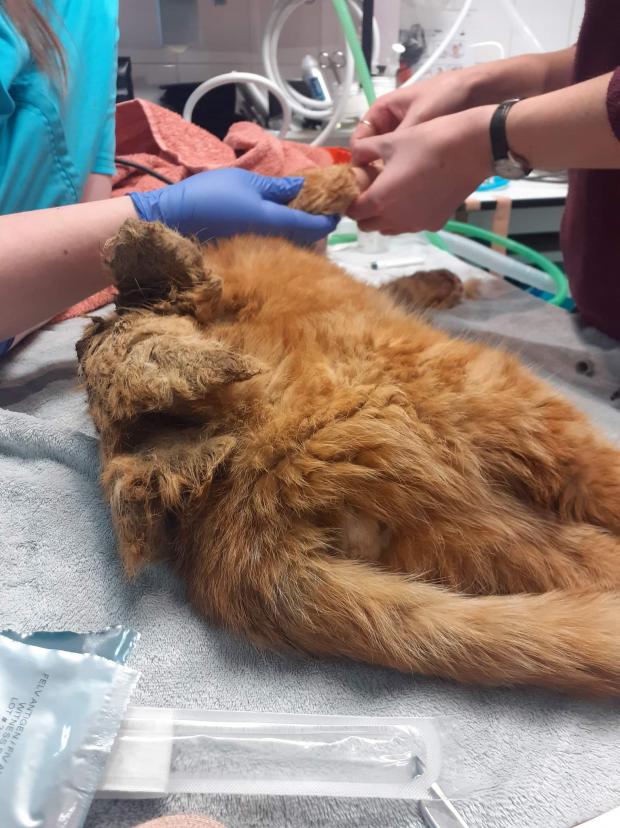Wednesday, 8 June 2022
Hospital Visitor Henry
Friday, 3 June 2022
Call Me Cuddle Cat!


Monday, 2 May 2022
"Dinosaur" Cat Looking For A Home

Sweet cat Brian, dubbed the dinosaur cat, is looking for a home now he has been spruced up and treated by the Blue Cross rehoming centre in Oxfordshire in the UK.
Brian, who is around 14 years old, was found wandering the streets alone with huge, matted clumps of fur along his back which reminded one of the helpers of a stegosaurus!
Elisha Webber, Animal Welfare Assistant at Blue Cross said: “Poor Brian was in such a sorry state when he arrived with us. He was severely matted along his spine, dehydrated and was covered in fleas and ticks. He also needed extensive dental work and some teeth removed.
“We’re not sure how long he had been alone and wandering the streets but he’s a very sweet-natured boy with so much love to give. He enjoys his food and loves to curl up in a nice warm spot.
“His new owner will need to be patient with him as they’ll need to build up his trust but he’ll make a wonderful companion. He really does deserve a happy ending.”
Thursday, 21 April 2022
Life Lessons In Lingvistov Cartoons
Monday, 11 April 2022
The Enticing Dreamies
Monday, 21 March 2022
Is Your Cat A Psychopath?
Monday, 10 January 2022
Your Incredible Cat
- A cat can make over 100 vocal sounds (dogs can make 10)
- A cat sleeps around 14 to 18 hours a day on average
- Cats are the only animal that walks on their claws, not the pads of their feet.
- A cat has 32 muscles in each ear.
- A group of youngsters (kittens) is called a kindle; those old-timers (adult cats) form a clowder.
- The average cat food meal is the equivalent to about five mice.
- People who are allergic to cats are actually allergic to cat saliva or to cat dander. If the resident cat is bathed regularly the allergic people tolerate it better. Also, there are allergy shots available.
- Besides smelling with their nose, cats can smell with an additional organ called the Jacobson's organ, located in the upper surface of the mouth.
- Like birds, cats have a homing ability that uses their biological clock, the angle of the sun, and the Earth's magnetic field. A cat taken far from its home can return to it. But if a cat's owners move far from its home, the cat can't find them.
- A cat can jump even seven times as high as it is tall.
- America and the UK spend more annually on cat food than on baby food.
- It has been scientifically proven that owning cats is good for our health and can decrease the occurrence of high blood pressure and other illnesses. Stroking a cat can help to relieve stress, and the feel of a purring cat on your lap conveys a strong sense of security and comfort.
Friday, 7 January 2022
Music To Their Ears
Scientists from the University of Wisconsin-Madison in the US say cats hate music made by humans so they have composed what they claim is a cat-friendly tune that has a positive effect on your pet.
It might sound to you like a seven-year-old practising his violin lessons while kitty purrs in the background but to cats it's top of the pops. It's an octave higher than most human music which, says the scientists, suits cats' extra sensitive hearing. The tempo is that of purring.
In an experiment they played excerpts of classical musical to 47 felines in their own homes before trying out their own catty composition. The university researchers found the reaction was far more positive to their music rather than to composers like Mozart.
They suggest the music could be used at rescue shelters, catteries or zoos for those who use music to try and stimulate animals in various forms of captivity.
Psychology professor Charles Snowdon, who led the study, said: "We are not actually replicating cat sounds. We are trying to create music with a pitch and tempo that appeals to cats."
When played classical music, there was little or no reaction from the cats studied and when they did react, it took an average of 171 seconds to show signs they noticed the music. But when played the specially composed tunes, the cats purred and walked towards the speaker and rubbed against it - all positive behaviour in the world of cats - and after an average response time of 110 seconds.
Owners who play human music to cats to try and calm them or stimulate them, run into two problems, said Professor Snowdon. Either the cats don't hear it because of the pitch or they do hear it but do not regard it as "music".
We weren't too sure about this composition so who better to review it than our very own Carlton Cat? Take a look at his review here.
























